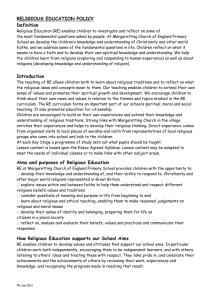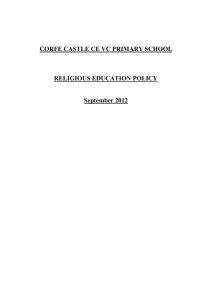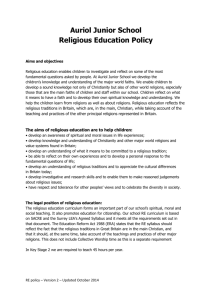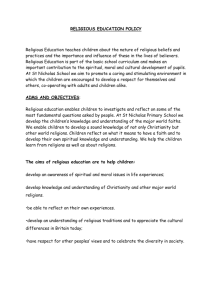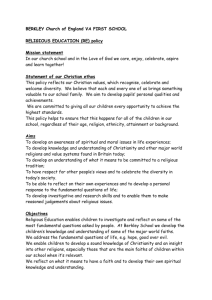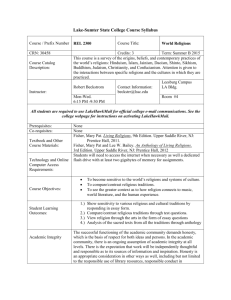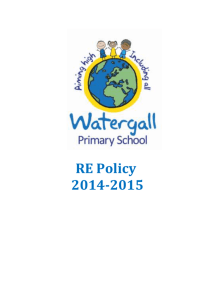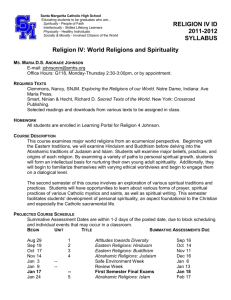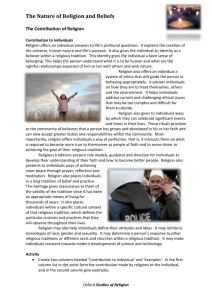Religious Education
advertisement
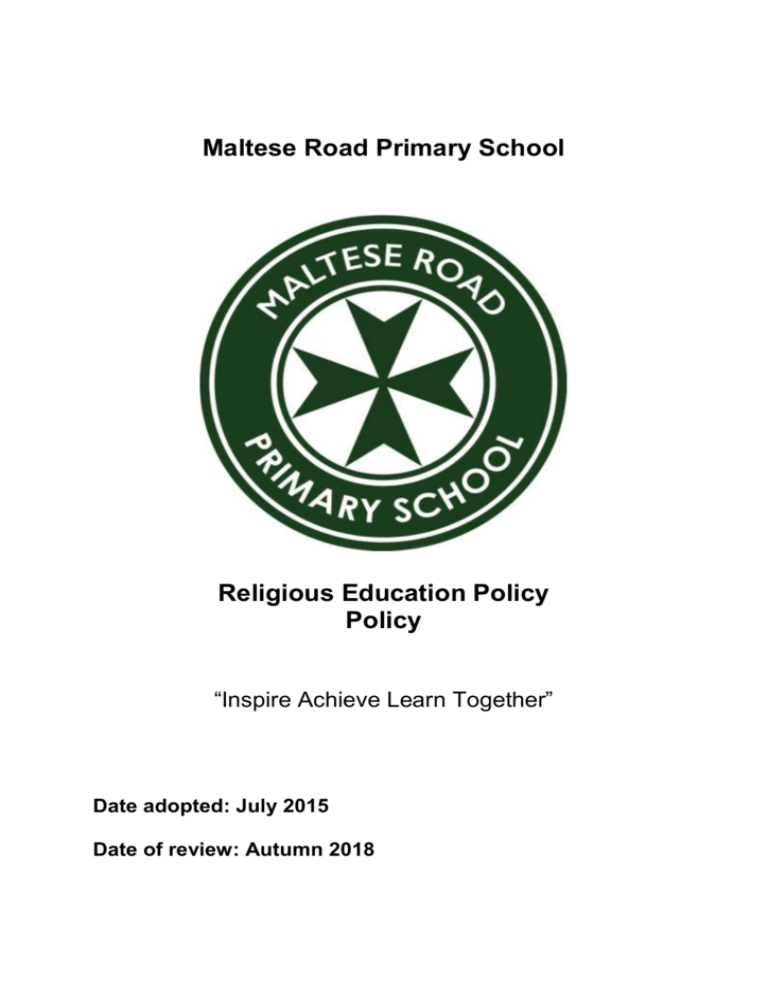
Maltese Road Primary School Religious Education Policy Policy “Inspire Achieve Learn Together” Date adopted: July 2015 Date of review: Autumn 2018 Policy 2010 Maltese Road Primary School Religious Education (RE) Policy 1 Aims and objectives 1.1 Religious education enables children to investigate and reflect on some of the most fundamental questions asked by people. At Maltese Road Primary School we develop the children’s knowledge and understanding of the major world faiths, and we address fundamental questions concerning, for example, the meaning of life and the existence of a divine spirit. We enable children to develop a sound knowledge not only of Christianity but also of other world religions, Children reflect on what it means to have a faith and to develop their own spiritual knowledge and understanding. We help the children learn from religions as well as about religions. 1.2 The objectives of teaching religious education in our school are to help children: develop an awareness of spiritual and moral issues arising in their lives develop knowledge and understanding of Christianity and other major world religions and value systems found in Britain develop an understanding of what it means to be committed to a religious tradition be able to reflect on their own experiences and to develop a personal response to the fundamental questions of life develop an understanding of religious traditions and to appreciate the cultural differences in Britain today develop investigative and research skills, and make reasoned judgements about religious issues have respect for other people’s views, and celebrate the diversity in society 2 The legal position of religious education 2.1 Our school curriculum for religious education meets the requirements of the 1988 Education Reform Act (ERA). The ERA stipulates that religious education is compulsory for all children, including those in the reception class who are less than five years old. The ERA allows parents to withdraw their child from religious education classes if they so wish, although only after they have given written notice to the school governors. The ERA also allows teachers to refuse to teach religious education, but only after they have given due notice of their intention to the school governors. The religious education curriculum forms an Page 2 of 5 7-Feb-16 Policy 2010 important part of our school’s spiritual, moral and social teaching. It also promotes education for citizenship. Our school RE curriculum is based on the LA’s Agreed Syllabus, and it meets all the requirements set out in that document. The ERA states that the RE syllabus should reflect the fact that religious traditions in Great Britain are in the main Christian, and that it should, at the same time, take account of the teachings and practices of other major religions. 3 Teaching and learning style 3.1 We base our teaching and learning style in RE on the key principle that good teaching in RE allows children both to learn about religious traditions and to reflect on what the religious ideas and concepts mean to them. Our teaching enables children to extend their own sense of values, and promotes their spiritual growth and development. We encourage children to think about their own views and values in relation to the themes and topics studied in the RE curriculum. 3.2 Our teaching and learning styles in RE enable children to build on their own experiences and to extend their knowledge and understanding of religious traditions. We use their experiences at religious festivals such as Easter, Diwali, Passover etc. to develop their religious thinking. We organise visits to local places of worship, and invite representatives of local religious groups to come into school and talk to the children. 3.3 Children carry out research into religious topics. They study particular religious faiths and also compare the religious views of different faith groups on topics such as rites of passage or festivals. Children investigate religious and moral issues either individually or in groups. 3.4 We recognise the fact that all classes in our school have children of widely differing abilities, so we provide suitable learning opportunities for all children by matching the challenge of the task to the ability of the child. We achieve this in a variety of ways, for example, by: setting tasks which are open-ended and can have a variety of responses setting tasks of increasing difficulty (we do not expect all children to complete all tasks) grouping the children by ability in the room, and setting different tasks for each ability group providing resources of different complexity, adapted to the ability of the child Page 3 of 5 7-Feb-16 Policy 2010 4 Curriculum planning in religious education 4.1 We plan our religious education curriculum in accordance with the Local Authorities’ Agreed Syllabus. We ensure that the topics studied in religious education build on prior learning. We offer opportunities for children of all abilities to develop their skills and knowledge in each unit, and we ensure that the progression planned into the scheme of work offers the children an increasing challenge as they move through the school. 4.2 We carry out the curriculum planning in religious education in three phases (long-term, medium-term and short-term). The long-term plan maps the religious education topics studied in each term during each key stage. The RE subject leader devises this plan in collaboration with teaching colleagues in each year group. We teach religious education topics in conjunction with other subjects, especially at Key Stage 1. Some of our medium-term (termly) topics have a particular historical focus. In Key Stage 2 we place an increasing emphasis on the study of religious themes and topics in their own right. 4.3 Our medium-term plans give details of each unit of work for each term. The RE subject leader keeps and reviews these plans on a regular basis. 4.4 The class teacher writes the plans for each lesson and lists the specific learning objectives and expected outcomes. S/he keeps these individual plans and often discusses them on an informal basis with the RE subject leader. 5 The Foundation Stage 5.1 We teach religious education to all children in the school, including those in the reception class. 5.2 In reception classes, religious education is an integral part of the topic work covered during the year. As the reception class is part of the Foundation Stage of the National Curriculum, we relate the religious education aspects of the children’s work to the objectives set out in the Early Learning Goals which underpin the curriculum planning for children aged three to five. 6 Assessment for learning 6.1 Children demonstrate their ability in RE through a variety of different ways. Younger children might, for example, act out a famous story from the Bible, whilst older pupils might produce a PowerPoint presentation based on their investigation of sacred texts. Teachers will assess children’s work in religious education by making informal judgements as Page 4 of 5 7-Feb-16 Policy 2010 we observe them during lessons. On completion of a piece of work, the teacher assesses the work and gives the child written or verbal feedback to help guide progress. Older children are encouraged to make judgements about how they might improve their work in the future. The teacher will record the progress at the end of a unit of work .This information is used to assess the progress of each child, for setting new goals, and for passing information on to the next teacher at the end of the year. 6.2 The RE subject leader keeps samples of children’s work in a portfolio. This demonstrates the expected level of achievement in RE in each year of the school. 7 Resources 7.1 We keep resources for religious education in a central store where there is a box of equipment for each unit of work. There is a set of bibles for both key stages, and a collection of religious artefacts which we use to enrich teaching in religious education. The school library has a good supply of RE topic books and there is some computer software to support the children’s individual research. 8 Monitoring and review 8.1 The RE subject leader is responsible for monitoring the standards of the children’s work and the quality of the teaching in religious education. S/he is also responsible for supporting colleagues in their teaching, for being informed about current developments in the subject, and for providing a strategic lead and direction for RE in the school. The subject leader presents the headteacher with an annual report which evaluates strengths and weaknesses in the subject and indicates areas for further improvement. S/he has specially-allocated time for carrying out the vital task of reviewing samples of the children’s work and visiting classes to observe teaching in the subject. 11.2 This policy will be reviewed at least every three years. Signed: J J Figg Date: July 2015 Page 5 of 5 7-Feb-16
